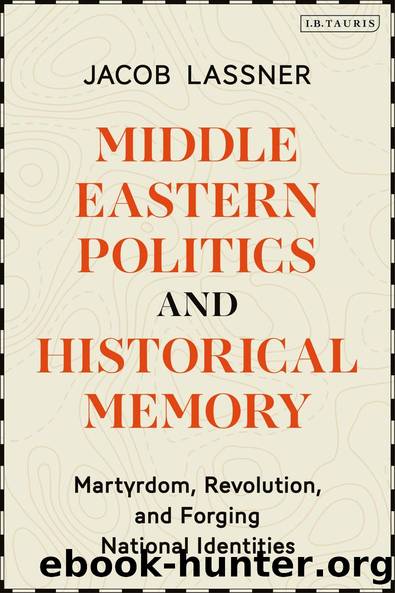Middle Eastern Politics and Historical Memory: Martyrdom, Revolution, and Forging National Identities by Jacob Lassner

Author:Jacob Lassner [Lassner, Jacob]
Language: eng
Format: epub
Tags: History, Middle East, General, Revolutionary, Political Science, Political Ideologies, Nationalism & Patriotism, Social Science, Islamic Studies, Psychology, Cognitive Psychology & Cognition
ISBN: 9781838607289
Google: cdLsDwAAQBAJ
Goodreads: 49672394
Publisher: I.B. Tauris
Published: 2020-07-09T01:49:04+00:00
Arab Nationalism and National Identity
It was also in Istanbul that Feisal became attracted to the concept of nationalism. As a youngish man, he traveled in circles that formed the secret Arab political societies, whose aim it was to liberate the Arab provinces of the Ottoman Empire from the direct yoke of their Turkish masters. Individuals from a variety of Arab lands frequented these circles, most of them, like Feisal, were highly literate and well acquainted with developments in Europe. Angered by the Turkish treatment of Arab dissidents in Syria, a breeding ground for newly established Arab nationalist sentiments, Feisal joined the revolt against the Ottomans led by his father Hussein, who had since returned to Arabia as guardian of the holy precincts. The revolt directly supported by the British who had gone to war with the Ottomans, allowed Feisal to ingratiate himself with his British handlers. Hence, their willingness to install him as king of Iraq, a trusted Arab ruler, who with proper constraints would do their bidding.
For Feisal, forging a relationship with the populace of the new Iraq, while at the same time he and the Hashimites tried to lessen British control, represented a formidable task. He was installed on his throne by the British in 1921, following a costly revolt by Arab tribesmen the previous year. To create some sense of stability on which to anchor its regime, the monarchy had to introduce an Iraqi identity that could unify the diverse population of the three former Ottoman districts that constituted the modern state. At the same time, any nation building scheme had to proceed without the foreign-born king appearing too closely linked to his European patrons. Feisal also had to be concerned about unduly alarming the British, who administered Iraq for the international community from 1921 to 1932 and then, following Iraqi independence, sought to influence affairs in the country by less direct means.
To accomplish these objectives, Feisal was obliged to play the cards of Arab nationalism, a game that the new monarch eagerly embraced. His political views on Arabism were forged in the crucible of nationalist circles that he had frequented and much admired. Nor was the appeal to Arab unity limited to Feisal and the Hashimite monarchs who followed him. All the subsequent players who ruled or wished to rule Iraq, trumpeted the notion of an Iraqi unity based on Arab affiliation and, beyond that, a central, if not dominant role for the Iraqi people and its state within the larger Arab nation. The concept of Arab unity (wahdah) has been central to its ideology from the very outset of the Baath party in the 1940s.31 The partyâs Sorbonne-educated and highly cosmopolitan founders included, among others, a Greek Orthodox Christian and an âAlawite, that is a representative from a sectarian offshoot of Shiâite Islam. They were not inclined to link national unity to traditional Islam alone. That is not to say, the Baath had a truly secular orientation, as some scholars suggest. Rather, the Baathists have
Download
This site does not store any files on its server. We only index and link to content provided by other sites. Please contact the content providers to delete copyright contents if any and email us, we'll remove relevant links or contents immediately.
| Africa | Americas |
| Arctic & Antarctica | Asia |
| Australia & Oceania | Europe |
| Middle East | Russia |
| United States | World |
| Ancient Civilizations | Military |
| Historical Study & Educational Resources |
Machine Learning at Scale with H2O by Gregory Keys | David Whiting(4292)
Never by Ken Follett(3937)
Fairy Tale by Stephen King(3370)
Oathbringer (The Stormlight Archive, Book 3) by Brandon Sanderson(3157)
The Man Who Died Twice by Richard Osman(3072)
Will by Will Smith(2908)
Rationality by Steven Pinker(2352)
Can't Hurt Me: Master Your Mind and Defy the Odds - Clean Edition by David Goggins(2323)
The Dark Hours by Michael Connelly(2300)
Friends, Lovers, and the Big Terrible Thing by Matthew Perry(2219)
The Dawn of Everything: A New History of Humanity by David Graeber & David Wengrow(2197)
Principles for Dealing With the Changing World Order: Why Nations Succeed and Fail by Ray Dalio(2039)
A Short History of War by Jeremy Black(1842)
HBR's 10 Must Reads 2022 by Harvard Business Review(1839)
Go Tell the Bees That I Am Gone by Diana Gabaldon(1754)
A Game of Thrones (The Illustrated Edition) by George R. R. Martin(1722)
Kingdom of Ash by Maas Sarah J(1668)
515945210 by Unknown(1660)
443319537 by Unknown(1545)
